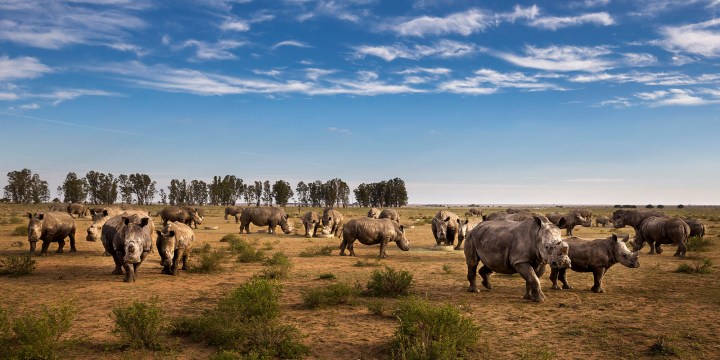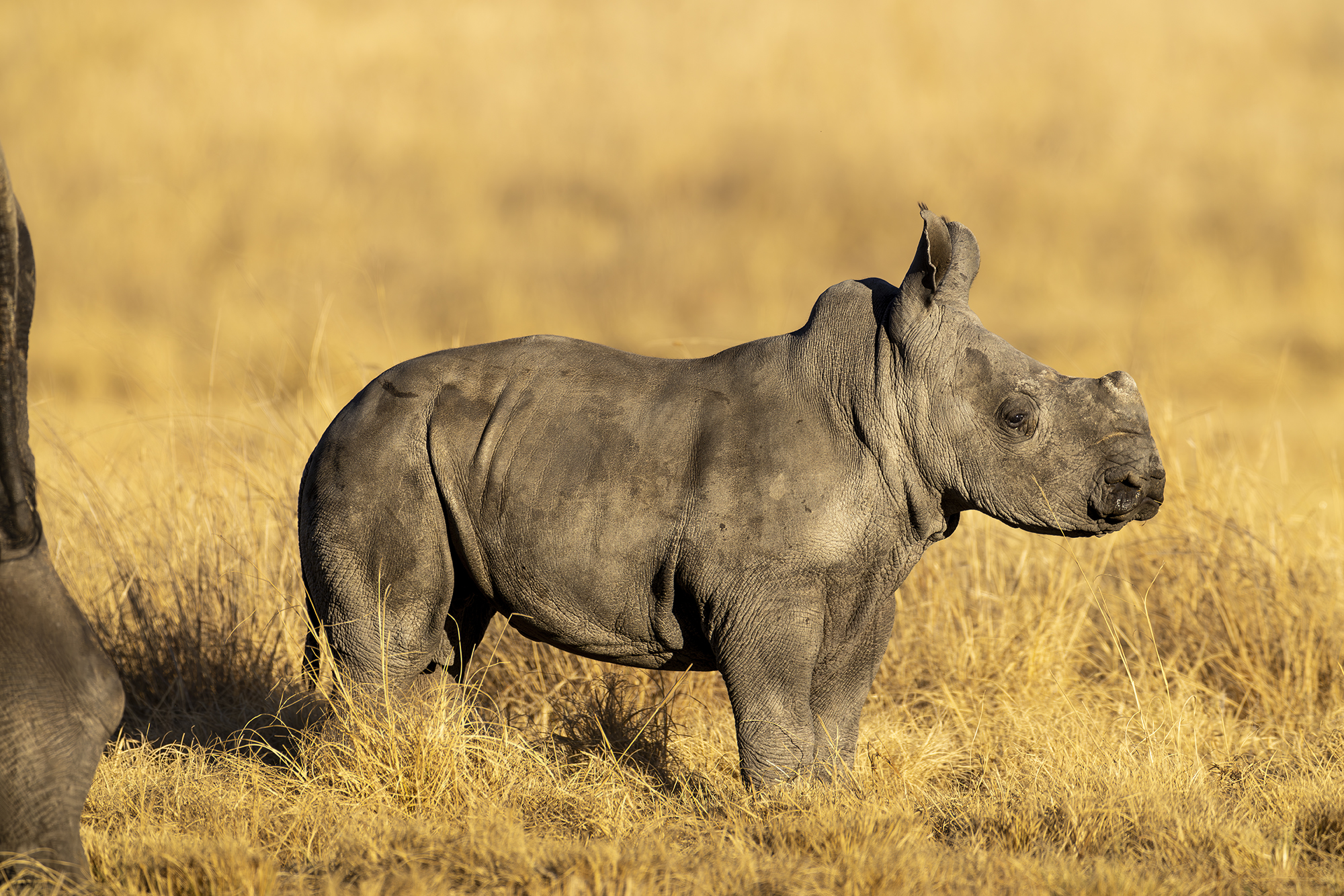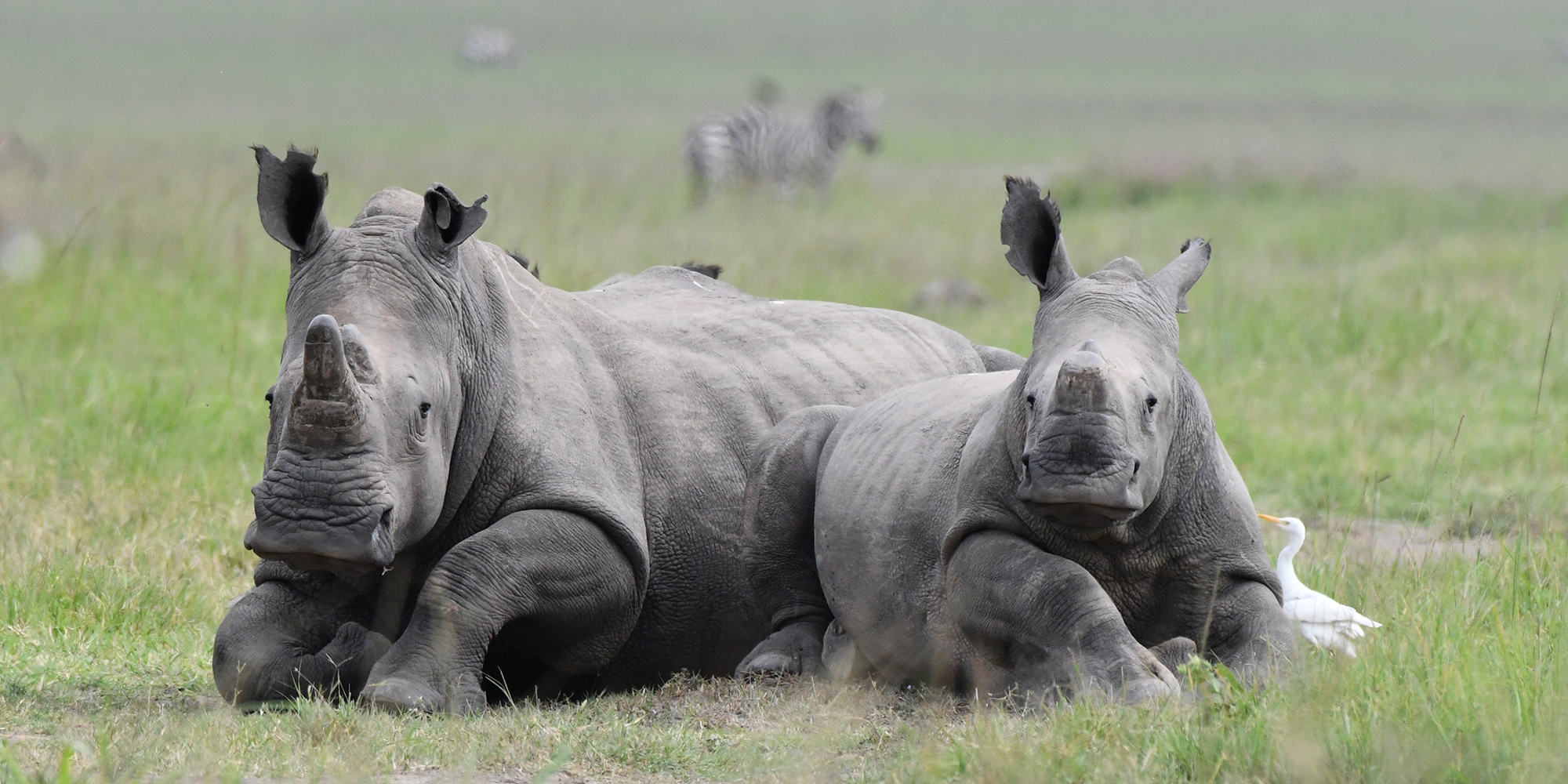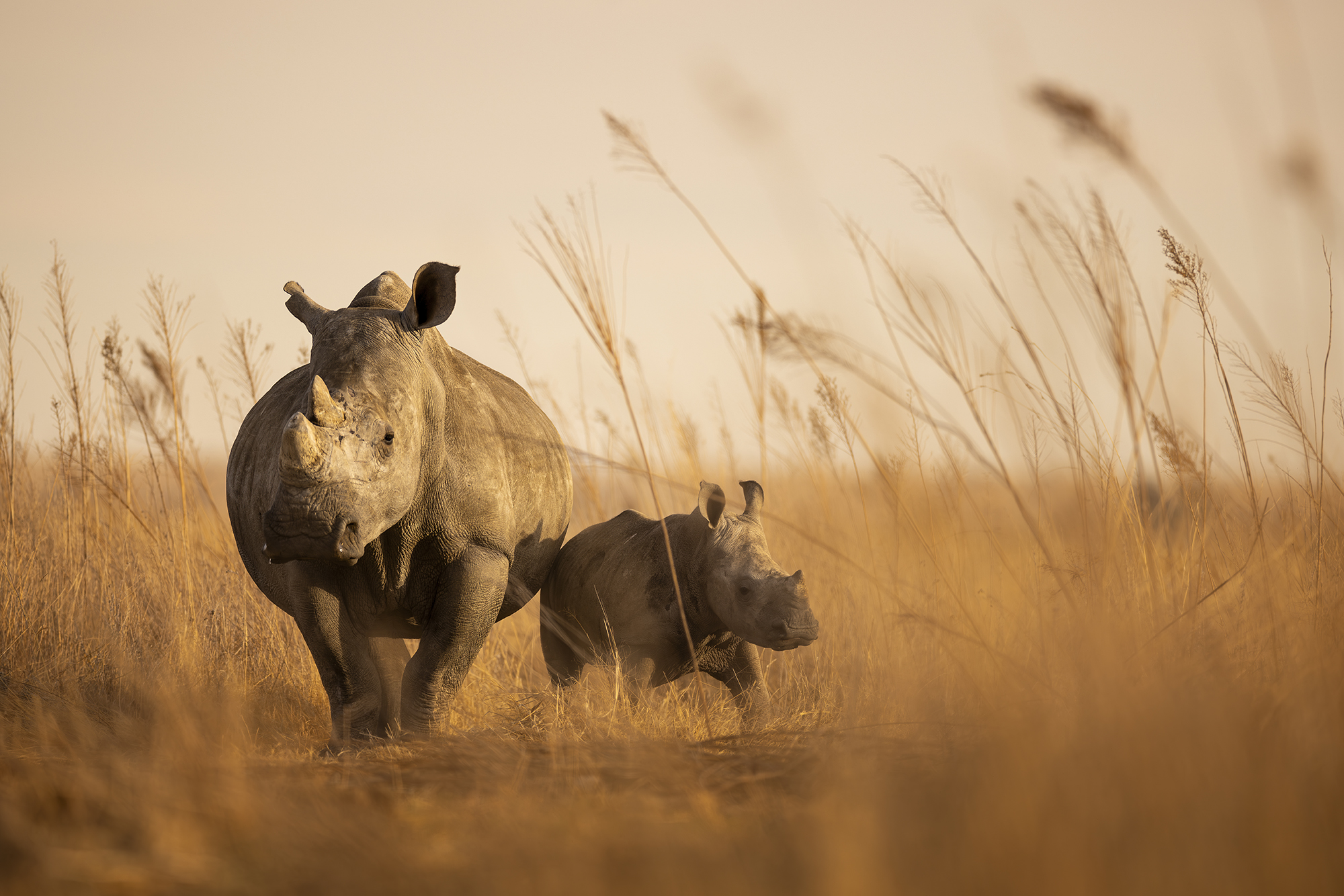SAVING PRIVATE RHINO
Hume’s herd of 2,000 African rhinos get a last-minute ‘lifeline’ in major purchase and rewilding project

When John Hume put his 2,000 rhino up for auction in April, he didn’t receive a single bid. On Monday night, the NGO African Parks announced it would purchase the world’s largest population of privately owned white rhinos, which will be ‘rewilded’ over 10 years.
Africa’s beleaguered rhinos have been thrown a significant lifeline with the announcement that nearly 2,000 semi-wild rhinos owned by South African rhino breeder John Hume will be “rewilded” into reserves across South Africa and other parts of the continent over the next 10 years.
African Parks, a private Johannesburg-based conservation NGO that manages 22 protected areas in partnership with 12 governments across Africa, confirmed on Monday, 4 September that it had “stepped in as the new owner of the world’s largest private captive rhino breeding operation”, the Platinum Rhino project, a 7,800-hectare property in North West.

Southern white rhino calf. (Photo: Brent Stirton / African Parks)
The project was started by Hume, a wealthy property developer turned wildlife rancher who has earned both opprobrium and praise for his decades-old initiative to breed rhinos, harvest their horns without harming them physically and then sell the horns to buyers in the Far East.
Read more in Daily Maverick: With 2,000 rhinos up for sale but few takers, it’s time for an urgent rethink
However, with no indication that the majority of member states of the Convention on International Trade in Endangered Species (CITES) are willing to overturn the 1974 international ban on the trade in rhino horns, Hume announced earlier this year that he had run out of funds to keep his project going and was offering them for sale via an online auction.
But by all accounts, very few bidders showed any interest, casting the future security and welfare of the about 2000 rhinos into jeopardy.
Read more in Daily Maverick: John Hume’s Platinum Rhino project has no viable business model – that bodes ill for big critter conservation
That changed on Monday, 4 August when African Parks CEO Peter Fearnhead confirmed in a statement that his organisation had agreed to purchase the Platinum Rhino farm and all its rhinos – with the endorsement of the South African Government and the African Rhino Specialist Group of the International Union for the Conservation of Nature (IUCN).

White Rhino at Akagera National Park in Rwanda. (Photo: Drew Bantlin)
Dr Mike Knight, chairman of the IUCN specialist group, told Daily Maverick on Monday he regarded African Parks as a credible and responsible conservation organisation and was optimistic that the animals could be successfully rewilded.
“The key thing will be finding conservation areas that are large enough and secure from poaching… The conservation sector is delighted that African Parks can provide a credible solution for this important population, and a significant lifeline for this Near Threatened species.”
African Parks – without disclosing any of the financial arrangements of the deal – said it had agreed to purchase the farm and all 2,000 southern white rhino with one clear objective: “To rewild these rhino over the next 10 years to well-managed and secure areas, establishing or supplementing strategic populations, thereby de-risking the future of the species”.
The opening bid for the rhinos at auction was set at $10-million (R182-million) though Hume was reportedly claimed to have spent $150-million on rhino breeding over the past 30 years.
Following the deal with African Parks, Hume’s breeding programme, based in North West, will be phased out and the project will end once all the rhinos are released into the wild.
“This is one of the largest continent-wide rewilding endeavours to occur for any species,” the NGO said, noting that Hume’s captive-bred rhinos represented nearly 15% of the world’s remaining wild rhino population.
“As a result of financial stress, Platinum Rhino was put up for auction on the 26th of April 2023, but did not receive any bids, putting these rhinos at serious risk of poaching and fragmentation.

White rhino cow and calf. (Photo: Brent Stirton / African Parks)
“Given African Parks’ experience in effectively managing protected areas and carrying out wildlife translocations at scale, including bringing rhino back to Rwanda, Malawi and Democratic Republic of the Congo, African Parks was approached by numerous concerned individuals from the conservation sector to provide a solution to prevent a potential conservation crisis, and to help secure the future for a species in decline.
“After conducting a thorough due diligence and with the support of the South African government, as well as having secured emergency funding to make the transaction possible, African Parks agreed to purchase the farm and all 2,000 rhinos.
“African Parks had no intention of being the owner of a captive rhino breeding operation with 2,000 rhinos. However, we fully recognise the moral imperative of finding a solution for these animals, so that they can once again play their integral role in fully functioning ecosystems,” said Fearnhead.
“The scale of this undertaking is simply enormous, and therefore daunting. However, it is equally one of the most exciting and globally strategic conservation opportunities. We will be working with multiple governments, funding partners and conservation organisations, who are committed to making this rewilding vision a reality.”
‘Easy’ rewilding
Dr Richard Emslie, a Pietermaritzburg-based rhino conservation expert, told Daily Maverick he was confident that the mostly captive-bred rhinos could be “rewilded very easily”.
“I would call them ‘semi-wild’ rather than ‘semi-captive’. It’s interesting that some of John Hume’s black rhinos were sent to a property in Eswatini a few years ago – and within just a few months of their arrival one of the females had been mated by a wild rhino. So I strongly suspect his white rhinos will also do fine. Obviously, this will depend on where they are going.”
Emslie said he also believed that Hume deserved credit for building up such a large population and protecting them at his own expense at a time when other state-managed rhino populations had been decimated.
Barbara Creecy, the national Minister of Environmental Affairs is currently in Kenya for a climate change meeting and could not be reached for comment on Monday night.
However, African Parks quoted her in a media statement as congratulating both John Hume and African Parks for “reaching this important agreement which facilitates a conservation solution for the rhino currently in a captive facility”.
“Our Government is guided in our approach to conservation by the UN Convention on Biodiversity and our own white paper. In this regard we are ready to support African Parks and other partners with technical and scientific advice in developing a conservation solution that includes translocating the animals over a period of time to suitable parks and community conservancies in South Africa and on the African continent,” the statement said.
The white rhino as a species is under extreme pressure, especially in South Africa, because of poaching. White rhinos historically consisted of two subspecies: the southern white and the northern white. The northern white rhino is functionally extinct, with just two non-breeding females in captivity in Kenya.
Southern white rhino reached an all-time low of 30 to 40 animals in the 1930s, but through effective conservation measures, increased to about 20,000 individuals by 2012. However, with the dramatic rise in poaching for their horns for the illegal wildlife trade, their numbers have fallen to below 13,000 today. DM














Good news all round. Well done to John Hume and African Parks
Splendid news that John Humes rhinos will ultimately be rewilded.
Without this intervention and given Hume’s age, the animals and rhino species faced a bleak future. This project should be a slam-dunk for crowd-funding or for one of the dollar billionaire foundations to adopt. $10m is peanuts in the global scope.
As to ending the market for rhino horn : seed the market with rhino horns laced with a chemical that makes the buyer’s ‘horn’ shrivel and fall off. A hundred cases and demand will disappear.
Such a shame that John Hume had to be bankrupted in the process.
Finally some positive news amongst all the bad news that we’re constantly inundated with.
Kudos to African Parks for stepping in to take over what could’ve turned into a shambles.
“Emslie said he also believed that Hume deserved credit for building up such a large population and protecting them at his own expense at a time when other state-managed rhino populations had been decimated.”
Mr Hume deserves an international conservation award for all that he has done for the species. I have a GREAT admiration for Mr Hume – Thank you to African Parks for saving this project and I wish you all the success possible for rewilding. I will gladly offer my time for free if I can help. I worked in rhino conservation for six years and they earned my undying love and loyalty. They are ICONIC!
Wonderful positive news. All concerned deserve thanks and good wishes for success.
So glad a solution has been found!!
Well done for the future of the species and for the continued efforts in nature conservation.
Is this an old article, or is the date (4 August) incorrect. It seems 4 August was a Friday and not a Monday.
African Parks to the rescue again! The continent’s wildlife and wild spaces would be doomed without them.
My herat goes out to John Hume and African Parks!……Very well done guys and may you be greatly blessed in your future conservation endeavours in trans-locating these wonderful animals.
Hooray. Wonderful news.
A beacon of hope. Thanks so much John Hume and Africa Parks. Now if only China, our new BRICS friend, (and Vietnam) could be encouraged by Cyril to simply ban the rhino trade from their side. Quid pro quo in return for Xi’s fun holiday in Sandton! Plus both of our fellow Communist buddies still have the death penalty, so easily enforced.
It will be interesting to see where these rhinos are sent to. Rhinos have been pretty much exterminated in Kruger, and are headed that way in KZN parks as well. They will very quickly be poached if they are sent there. I wonder whether most of them will go to AP reserves in other African countries. AP have done an amazing job restoring and securing degraded parks in a number of countries, Malawi being perhaps the most spectacular. There should be opportunities for the rhino in AP parks in Malawi, Zambia and Rwanda. The sad truth in South Africa is that despite very large resources, the state-managed parks have been unable to protect rhinos. One can only assume that insiders are involved.